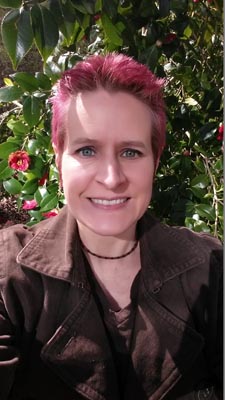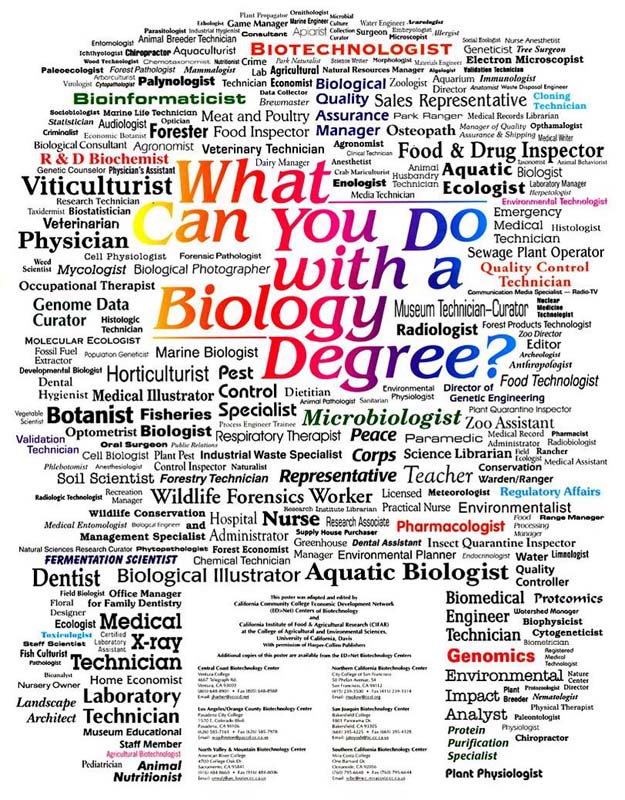|
Jobs
with a Biology Degree (i.e. "What are my options?")
There are many different entry levels
for jobs in Biology. "Entry level" refers to what kind of
degree is required for the job. Here are some examples of "entry
levels":
High School diploma - Some jobs only require a high school
diploma (otherwise known as "secondary education") because
the skills required are taught to employees as "on-the-job"
training. All experience and skills required are taught after you're
hired. Sometimes these jobs are considered "apprenticeships"
in which you study under someone with many years of experience in
the field. Often these apprenticeships end in "certification"
to work in a particular area.
Post-secondary
non-degree - Post-secondary education
is any education or training after attaining a high school diploma.
There is a wide variety of Post-secondary training programs available.
This training can be given in the form of apprenticeships (see above)
or even from vocational schools, community colleges, and technical
colleges. The difference with this training is that it does not necessarily
result in attaining a specific degree.
Associate's degree - An associate's degree is typically a 2-year
"technical" degree in a particular biological or health
program and can be offered by community colleges, junior colleges,
and technical colleges. In some cases, even 4-year colleges offer
an associate's degree program.
Bachelor's degree - A bachelor's degree is 4-year degree in
Biology in which you complete prerequisite courses in Biology as well
as other science courses like chemistry and physics. Additionally,
a bachelor's degree also requires some coursework in english, math,
social sciences, humanities, and the arts - in order to provide students
a well-rounded education. A Bachelor's degree is often used as a stepping
stone for applying to higher education programs, such as a Master's,
and Doctoral education (see below).
Master's degree - A Master's degree is a 2 - 3 yr program in
a particular area of Biology and is offered at 4-year Universities.
You can get either a Master of Arts degree (MA) or a Master of Science
(MSc) degree. An MA is primarily course-based or a mixture of coursework
and research. A MSc degree involves conducting research studies that
are written up and defended as a "thesis". There are many
specialties you can can an MSc degree such as biology (in any subdiscipline
thereof), physical or occupational therapy, physician assistant, prosthetics,
and many, many more!
Doctoral (Ph.D.) degree - A Ph.D. is the highest degree you
can attain in a particular program and discipline. It can take anywhere
from 3 - 6 years to get a Ph.D. degree depending on the program and
the focus of study. It is primarily a research-based program in which
you design and conduct research experiments and write up and defend
a dissertation in order to earn your degree.
|
Internet
Resources
****This
is a GREAT place to start looking for a large listing of biology and
healthcare related jobs, average pay, and educational requirements
for these jobs! The United
States Department of Labor: Occupational Outlook Handbook, 2013.
NIU Career Services is another good web resource with links to
possible jobs with a BSc degree and links to biology-related job sites.
South Carolina State Government e-recruit system (http://jobs.sc.gov)
See for state and/or government jobs in South Carolina
Jobs
with the US Department of Health and Human Services
Jobs
with the US Department of Energy
Jobs with
the US Geological Survey (USGS)
Jobs with the
US Fish and Wildlife Service
Jobs with
the Centers for Disease Control (CDC)
Jobs with the
National Institutes of Health (NIH)
Salary
Survey for Bachelor of Science (BS) degree
What can I expect to get paid with a Biology degree?
Jobs
in Science (from New Scientist Jobs)
Jobs
in Biomedical Sciences
Biology
careers and related organizations
Careers in the Biological Sciences (American Institute of Biological
Sciences) - www.aibs.org/careers/
|

